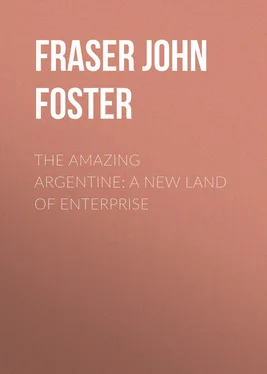John Fraser - The Amazing Argentine - A New Land of Enterprise
Здесь есть возможность читать онлайн «John Fraser - The Amazing Argentine - A New Land of Enterprise» — ознакомительный отрывок электронной книги совершенно бесплатно, а после прочтения отрывка купить полную версию. В некоторых случаях можно слушать аудио, скачать через торрент в формате fb2 и присутствует краткое содержание. Жанр: foreign_antique, foreign_prose, Путешествия и география, на английском языке. Описание произведения, (предисловие) а так же отзывы посетителей доступны на портале библиотеки ЛибКат.
- Название:The Amazing Argentine: A New Land of Enterprise
- Автор:
- Жанр:
- Год:неизвестен
- ISBN:нет данных
- Рейтинг книги:5 / 5. Голосов: 1
-
Избранное:Добавить в избранное
- Отзывы:
-
Ваша оценка:
- 100
- 1
- 2
- 3
- 4
- 5
The Amazing Argentine: A New Land of Enterprise: краткое содержание, описание и аннотация
Предлагаем к чтению аннотацию, описание, краткое содержание или предисловие (зависит от того, что написал сам автор книги «The Amazing Argentine: A New Land of Enterprise»). Если вы не нашли необходимую информацию о книге — напишите в комментариях, мы постараемся отыскать её.
The Amazing Argentine: A New Land of Enterprise — читать онлайн ознакомительный отрывок
Ниже представлен текст книги, разбитый по страницам. Система сохранения места последней прочитанной страницы, позволяет с удобством читать онлайн бесплатно книгу «The Amazing Argentine: A New Land of Enterprise», без необходимости каждый раз заново искать на чём Вы остановились. Поставьте закладку, и сможете в любой момент перейти на страницу, на которой закончили чтение.
Интервал:
Закладка:
Now drainage has done wonders, and Santos, a great export town for Brazilian coffee, is improving itself. I get into conversation with the man who has been engaged to settle in Santos and see that the place is improved. The river is deep, serviceable, and runs far inland. Casting my eye over the flat lands, matted with vegetation, and dotted with many a wretched nigger shanty, I have a vision of the time when docks will be delved and many of the riches of Brazil will find their outlet to the world by this gateway. Great wharves are on the river front at Santos.
The town, however, is in a hugger-mugger of change. The Brazilians seem to lounge round, but they are forging for the future. Men who have been with us for a fortnight hasten ashore. They have eagerness. They are off by the quaint hill-climbing railway to San Paulo, high perched, healthy, throbbing with trade. Others are bent for the interior, away from their kind, to seek their fortunes.
"And that's the end of my six months' leave," says a red-faced Englishman with a sorrowful smile. "I lived away back there for three years, and never saw or talked to another Englishman. I've been home for my holiday, and now it will be another three years before I come back from the plantations. Good-bye. I'll hunt you up when I'm in London again." Off he goes – one of the brave men of the world.
A peep at Monte Video, the neat capital of the miniature Republic of Uruguay, and then the black-green of the ocean we have been travelling for three weeks is left behind, and we are forcing a way up the yellow waters of the River Plate. A river; but for hours there is no land in sight, so wide is the mouth of this great stream. And shallow, for at intervals the steamer shivers as she bumps on the bottom.
"That is all right," says the captain, "for we do not mind a couple of feet of mud."
The journey of the new adventurers is nearing its end. Shipboard friendships are sworn to be eternal. The ship's sports are long over, and the prizes have been distributed. The fancy dress ball on deck is a memory. There is the distribution of largesse amongst those who have made things pleasant. Cabin passengers are light-hearted. The throng of Spaniards and Italians in the steerage are silent and strangely impressed. They were sad when they left the old lands; they were happy during the voyage; now the mystery of the unknown is laying hold of them. We pass a crowded emigrant ship from Italy, and cheers are exchanged.
Out of the haze of the hot day rises the low land, Argentina. We see the buildings of La Plata, once intended to be the capital of the country. The ship makes strange zigzags, for it is following a channel known only to the pilot. There rises a bank of smoke. As we get nearer we run into shipping. From the background emerge tall buildings, white mostly, and recalling the skyscrapers of the United States. So slowly, laboriously, the good ship Avon , which has behaved so well, is brought to rest in front of Buenos Aires. It is night, but the wharves are all commotion. There is the shrieking of tugs. There is the shout of excited Argentines, but their garb is south European. Beyond the Custom House can be seen hastening motor-cars and whizzing electric tramcars. And here is a newspaper man, wanting an interview. We are entering "the amazing Argentine."
CHAPTER II
SOME ASPECTS OF BUENOS AIRES
The Argentines call their city of Buenos Aires the Paris of the southern hemisphere. It has a population nearing a million and a half, which is greater than that of any other town below the line of the Equator. The people promise that in time it will overtake London.
You insult an Argentine if you mix him up with Chilians, Brazilians, and other South Americans. He does not thank you for being reminded his father sailed from Italy, or his grandfather from Spain. He has no affection for any old land from which his sires came. The beginning of the world for Argentina was in May, 1810, when the Republic was set up.
He has no pride of historic race. When he makes money and visits Europe it is not to find the ancestral home in Spain or Italy. It is to have a good time in Paris. When he takes his family to Paris it is not to spend three, five, or six months. It is to spend three, five, or six hundred thousand pesos – and the value of a peso is one shilling and eightpence. When the pesos have flown he returns to Argentina and makes more.
The Argentines are a dignified people. They accept the English because in round figures five hundred millions of British capital in gold have aided in developing the country. They dislike the citizen of the United States because the big brother Republic of the north patronises them, and they need nobody's help. They have a contempt for all other Latins beneath the Isthmus of Panama, particularly the Brazilians. They are conscious of their own qualities.
And the visitor blinks, and rubs his eyes, and admits the wonders of Argentina. If his acquaintance with geography is casual he has shrugged his shoulders at South American Republics, where they have revolutions every six weeks, and where tawny Spaniards in quaint costumes drive mules and die from difference of opinion with other Spaniards.
Then he goes to "B.A." – the familiar description of Buenos Aires – and he finds he has landed in a rampantly modern American-cum-European city. There is none of the sloth of the Southern, no checking of business between noon and three to pass in siestas.
It is a busy city. The port is thronged with shipping, mostly British. High-shouldered elevators stick out long tongues, and streams of wheat, grown on the plains of the interior, pour food for Europe into the holds. Trucks of cattle grunt through the noisy railway yards. There are huge killing establishments, and animals go to their death by the many thousand every day with a celerity which would awaken a Chicagoan. There are mighty avenues of chilled and frozen meat. Labour-saving machinery carries it on board the steamers which hasten across the Atlantic, carrying cheap beef to the London and Liverpool markets. Commerce is conducted on the latest scientific lines. The North Americans have nobbled the meat trade, and the Jews have control of the wheat market.
Buenos Aires is the mart where the produce of the rich back-lands is bartered. It levies a heavy toll. The most imposing business buildings are the banks – national banks, British, German, French, Spanish, and Italian banks. In and about Reconquista are these banks, ever busy. Near by are the rival shipping offices, a glut of them. The offices of the great railway companies are enormous. Wide-spreading premises exhibit the latest and best agricultural machinery that Lincolnshire and Illinois can produce. There is the hustle of commerce. The streets are as narrow and as crowded and as vital as within the City of London. There is earnestness about the men.
The Argentine is sombre in manner. He dresses in conventional black. A light waistcoat, a gay tie or fancy socks, is bad form. You cannot tell the difference between a millionaire and one of his clerks, except that the former has an expensive motor-car and the latter hires a taxi or a victoria, or travels by electric tramcar. At every corner you see evidence of prosperity, of successful money-making. And money speaks in "B.A." as loudly as it does in New York.
Folk of the Saxon breed tend to scoff at the decadence of the Latin race. But there is something revivifying in the transplanting of a people. We have evidence in our own colonies. The man of Spanish descent in the Argentine is not always the spry fellow he thinks himself; but he has dropped the cloak of sluggishness which enwraps Spain. He is often rich; he lives in a gorgeous residence; his extravagances are beyond those of a Russian archduke. He is polite and hospitable.
Читать дальшеИнтервал:
Закладка:
Похожие книги на «The Amazing Argentine: A New Land of Enterprise»
Представляем Вашему вниманию похожие книги на «The Amazing Argentine: A New Land of Enterprise» списком для выбора. Мы отобрали схожую по названию и смыслу литературу в надежде предоставить читателям больше вариантов отыскать новые, интересные, ещё непрочитанные произведения.
Обсуждение, отзывы о книге «The Amazing Argentine: A New Land of Enterprise» и просто собственные мнения читателей. Оставьте ваши комментарии, напишите, что Вы думаете о произведении, его смысле или главных героях. Укажите что конкретно понравилось, а что нет, и почему Вы так считаете.












